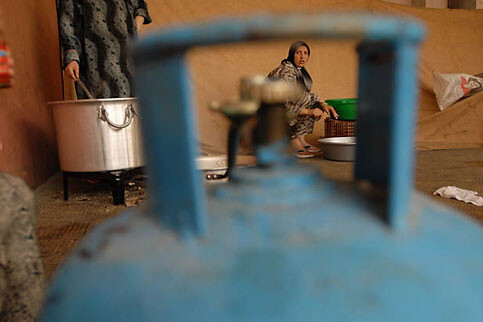Beirut 25 July 2006

Displaced women prepare a meal in the Bourj Hammoud High School (UNHCR/C. Lau)
Seven-year-old Liyan opens her eyes in the middle of the night and calls for her mum who is sitting with the adults in the family on the sidewalk. She says, “Send my greetings to my brothers and sisters if any harm happens to me,” then she closes her eyes and falls asleep. Twenty-two children and six of their parents fled from Deir Amess in Tyre the day before yesterday under Israel’s heavy shelling and bombs and slept on the streets of Hazmieh (a northern suburb of Beirut) after roaming the streets for one whole day.
Only two cars transporting 27 people were crossing the risky roads to escape bombing. On their way, the news on the radio announced the death of journalist Layal Najib in the bombardment of her car on the road to Siddeqine (a village in Tyre). Another piece of news followed: a new Israeli civilian massacre in Mansouri, killing those fleeing towards the port of Tyre to leave to Germany. The mother wanted to turn off the radio after the children started crying, but the father explained the importance of following the news to know which roads are targeted. “Israel does not give a map nor date for bombing,” answered the mother. Abu Haddid - iron man - was her eldest son’s nickname, though after his terror during the trip to refuge, that was changed to Abu Fijleh - radish man.
Twenty-seven people from Tawfic Aboud’s family, six of whom adults, left Deir Amess and looked for any place where they wouldn’t feel that their children’s spirits were being snatched from their bodies every time a rocket destroyed a neighboring house or a nearby field. The family members squeezed themselves in two cars and drove, as there were no shops open in their town, no milk for the babies, no pharmacy or medicine, not even a loaf of bread. Most important of all, it was the terror overtaking the children that drove them to escape, says the father. At Deir Amess, the children used to wait for the rockets. With the sound of each airplane, they trembled and said, “Mum, the rocket might hit us.”
On the road, the radio news about bombs keep coming: “Wounded under the ruins until they die,” “No ambulances are reaching remote villages on the border,” “Israel bombs ambulances,” “Israel is showering the villages with bombs,” “Civilians are being the primary target of Israel,” and so on.
In their village, as in other villages, one cannot check on a relative even if he or she lived across the street. Israel is not only trying to isolate the villages but also cut neighboring houses from one another.
The family opted to leave, although many in the village refused to do so. One woman said that her husband remained in the village and sent her with the children: “Only men that had to drive us came along”. From Tyre to Saida, then to Jezzine passing through the Chouf, the family arrived to Baakline, yet could not find a shelter. “The situation in the schools is very difficult,” and so they headed to Beirut. The family finally reached a basketball club on the periphery of the capital Beirut.
“There is no more room here,” answered the person in charge. After a long talk, and as it got dark, the family was allowed to sleep on the balcony of the club, with no mattresses or blankets. As soon as their exhausted bodies touched the floor to rest, the bombing of Beirut’s southern suburbs began, “As if we were still in our village in the south,” the family thought. The children started crying and imploring, “Take us to a place without bombing.” From the basketball club to Hazmieh, the Aboud family stopped the two cars. The adults left the seats for the children to sleep on and sat on the sidewalk. It is there where Liyan had woken up to make sure her greetings would reach her sisters and brothers, asleep in the other car.
The next day, significant efforts were made to find them a shelter. One of them suggested that they go back to the village: “It is better back there - at least one’s dignity is preserved.” The suggestion was not seconded as the family was hardly able to flee the bombed village. “As if we are strangers in our own country! We only want a ceiling to shelter our children; food is not an issue.”
Despite their suffering, the Abouds amuse themselves with one of the latest anecdotes of Liyan, who is very fond of the pop singer Haifa Wehbe. When the resistance threatened to hit the city of Haifa, Liyan thought the target was Haifa the singer and cried, “I very much love Nasrallah and the resistance, but why do they want to bomb Haifa [the singer]?”
Related Links
This article was originally published in the Arabic-language As-Safir newspaper 25 July 2006 and was translated by Zeina Abla and Sawsan Masri.


